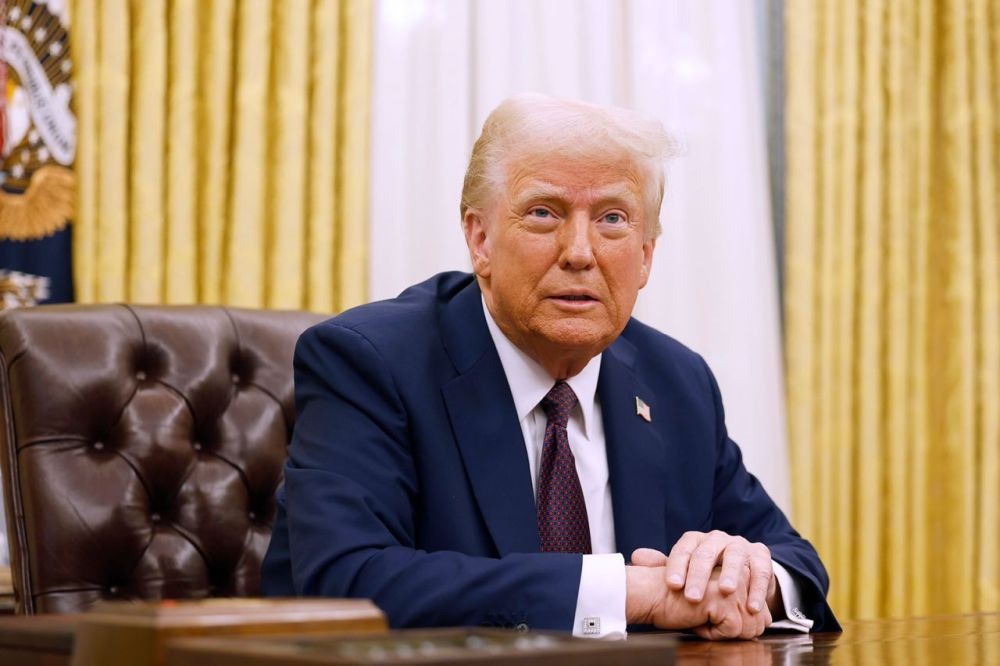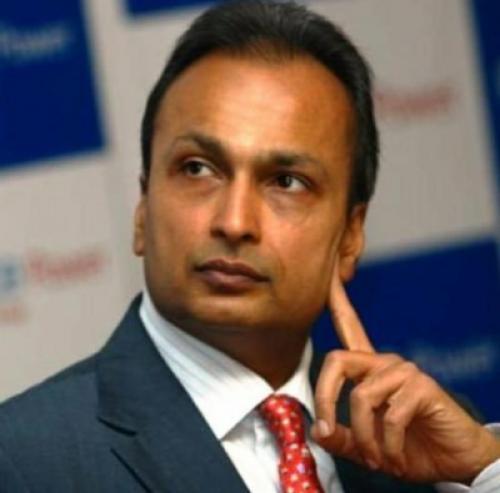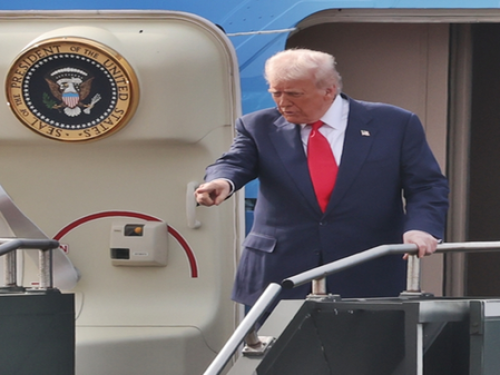In the first 100 days of his second term, President Donald Trump has aggressively pursued his "America First" agenda, dramatically reshaping the United States’ domestic policies and foreign posture. His administration's early actions—spanning sweeping tariffs, intensified immigration crackdowns, and controversial foreign policy pronouncements—have ignited fierce political battles and drawn condemnation from traditional allies. As his approval ratings plummet, both national and international observers are grappling with the long-term implications of Trump’s assertive, and often unorthodox, governing style.
A Radical Foreign Policy: Isolation, Provocation, and Grandiose Proposals
Trump’s foreign policy in his second term has taken a distinctly provocative turn. Echoing his campaign rhetoric, the administration has adopted an increasingly unilateral approach, often antagonizing allies and sidestepping diplomatic norms.
Annexation Fantasies and Global Friction
Among the most bewildering proposals from the White House are renewed calls for the U.S. to "take back" the Panama Canal, rename the Gulf of Mexico the “Gulf of America,” and annex Greenland.
Trump’s push to reclaim the Panama Canal has drawn sharp rebukes. Panama’s President Laurentino Cortizo responded bluntly, reaffirming that the canal “belongs to Panama and will continue belonging to Panama.” The canal, returned to Panama in 1999 under the Torrijos–Carter Treaties, remains a symbol of national pride and international law—making Trump’s statements not only inflammatory but diplomatically reckless.
Similarly, his executive order directing federal agencies to refer to the Gulf of Mexico as the "Gulf of America" was met with international ridicule. Mexican President Claudia Sheinbaum sarcastically suggested renaming North America to “Mexican America,” exposing the theatricality of Trump’s move and the lack of global recognition for such a unilateral rebranding.
Perhaps the most audacious proposal is the reassertion of U.S. claims over Greenland. Despite previously being rebuffed during his first term, Trump again floated the idea of purchasing the island. Greenland’s Prime Minister Jens-Frederik Nielsen forcefully rejected the idea, calling it “an absurd fantasy,” while Denmark reiterated its sovereignty, further straining transatlantic ties.
The Gaza Resort Proposal: A Diplomatic Firestorm
In February 2025, Trump ignited a global outcry by proposing that the United States “take over” the Gaza Strip and convert it into the “Riviera of the Middle East.” During a joint press conference with Israeli Prime Minister Benjamin Netanyahu, Trump suggested displacing the 2 million residents of Gaza and repurposing the territory for luxury tourism.
This proposal has been condemned across the Arab world and by international human rights organizations. Palestinian leaders declared the plan an affront to sovereignty and international law. Egypt and Jordan also expressed concern, warning that such actions would destabilize the region and spark humanitarian catastrophe. The proposal, while unlikely to be realized, has further diminished U.S. credibility in the Middle East.
Immigration Policy: Fear, Enforcement, and Legal Battles
President Trump’s second-term immigration agenda represents an intensification of his first-term hardline stance. His administration has implemented broad enforcement actions, expanded the reach of Immigration and Customs Enforcement (ICE), and framed immigration as a national security crisis.
Mass Deportations and Widespread Fear
Deportation raids have increased dramatically, often targeting individuals without criminal records. Family separations are once again making headlines, with reports of parents detained at school drop-offs or at their workplaces. Civil rights organizations, including the ACLU, have filed lawsuits alleging violations of due process and constitutional protections.
Even legal immigrants have felt the effects. Under new executive guidance, green card holders and visa applicants are now subject to heightened scrutiny, including retroactive investigations into social media activity and “loyalty to American values.”
As a result, immigrant communities report deepening fear and isolation. Community centers, Temples, Mosques, churches, and schools have seen declining attendance. Healthcare workers and mental health professionals warn of a crisis, particularly among children traumatized by the looming threat of family separation.
Sanctuary Cities Push Back
As federal enforcement expands, cities and states with sanctuary policies have become battlegrounds. Local leaders in California, Illinois, and New York have pledged to defy federal directives, prompting lawsuits and threats of funding cuts from the Trump administration. The clash underscores the growing divide between federal authority and local resistance.
Public opinion remains polarized. While Trump's base largely supports the tough stance, polls show growing concern among independents and younger voters about the humanitarian toll and erosion of civil liberties.
Economic Nationalism and the Tariff Wars
Trump’s trade policy in his second term has escalated into a full-blown tariff war. Framing it as a push for economic self-sufficiency and fairness, the administration has imposed a 20% blanket tariff on all imported goods and issued targeted tariffs on Chinese, Mexican, and Canadian products.
Tensions with Canada and Europe
Relations with Canada have deteriorated. Trump’s repeated insults toward then Prime Minister Justin Trudeau and increased tariffs on aluminum, lumber, and dairy have provoked retaliation. In response, Canada is deepening its trade relationships with the EU and Asia, signaling a long-term pivot away from U.S. dependence.
In Europe, Trump’s criticism of NATO spending, opposition to the EU’s digital sovereignty plans, and tariffs on EU vehicles and agricultural goods have alienated traditional allies. German Chancellor Annalena Baerbock and French President Emmanuel Macron have called for greater European strategic independence, including the establishment of a joint EU military force.
Standoff with China and Mexico
The tariff war with China has deepened. China has retaliated by halting rare earth exports and increasing cooperation with Russia and the ASEAN bloc. Trump’s labeling of China as a “hostile economic power” has cemented a cold economic conflict with no clear resolution, disrupting global supply chains and inflation-sensitive industries.
Mexico, too, has become a flashpoint. Trump threatened to impose punitive tariffs unless Mexico did more to curb migration—a move widely seen as political blackmail. In response, Mexican officials have begun exploring new trade partnerships in South America and Asia, distancing themselves from U.S. dependence.
Public Opinion: Rising Dissent and Divided Loyalties
Polls indicate that Trump’s aggressive second-term policies are wearing thin with the American public. A Washington Post-ABC News-Ipsos survey places his approval rating at 39%, with 55% disapproving. Among independents, his support has dropped below 30%—a troubling sign ahead of the 2026 midterms.
More than 60% of Americans believe Trump has overstepped his executive authority. A growing number see his administration as disrespecting the rule of law, particularly with his use of executive orders to bypass congressional approval. Civil society organizations warn that such centralization of power poses a threat to democratic institutions.
Backlash from MAGA Base?
Even among MAGA loyalists, some economic consequences are hitting home. A Reuters profile of Florida distributor Steve Egan illustrates this tension: soaring prices for imported goods like rubber ducks are eating into profits and forcing businesses to downsize. Still, many supporters remain hopeful that short-term pain will result in long-term industrial revitalization.
Nonetheless, dissent is growing. Trump’s brash leadership style, disregard for constitutional norms, and unfiltered policy announcements have triggered a broader reckoning, even among conservatives who once viewed him as a political savior.
Midterm Outlook and the Future of the GOP
As the 2026 midterm elections approach, historical trends suggest the president’s party is likely to suffer losses. Since 1950, the incumbent president’s party has lost seats in 17 out of 19 midterms. Analysts project that if current approval ratings persist, Democrats could reclaim the House and make gains in the Senate.
The Republican Dilemma
The Republican Party finds itself at a crossroads. Trump remains the party’s de facto leader, with the RNC pledging to back candidates aligned with his vision. But internal divisions are widening. Moderate Republicans fear the long-term damage from Trump's polarizing leadership, particularly among suburban voters and younger demographics.
GOP strategists face a dilemma: double down on Trumpism or attempt to rebrand the party for a post-Trump future. The outcome of the 2026 midterms will be decisive in charting that path.
A Defining Moment for American Democracy
Donald Trump’s first 100 days of his second term have been among the most tumultuous in modern presidential history. His blend of nationalism, populism, and authoritarian leanings has upended domestic and global norms. From controversial foreign policy gambits to divisive immigration enforcement and a bruising trade war, Trump has doubled down on his “America First” brand—alienating allies and inflaming domestic opposition.
With public disapproval rising, legal challenges mounting, and a critical midterm election on the horizon, the stakes for American democracy have never been higher. Whether Trump’s gamble pays off or backfires spectacularly may define not only the rest of his presidency but the future of the Republican Party—and of the United States itself.











